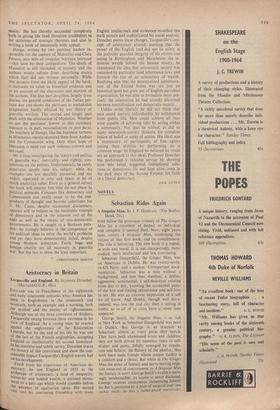Aristocracy in Britain
Tocqueville and England. By Seymour Drescher. (Harvard/O.U.P., 48s.)
ENGLAND was to Frenchmen of the eighteenth and early nineteenth centuries what America has been to Englishmen in the nineteenth and twentieth, both an example and a warning, both the symbol and the enemy of righteousness. Although one of the most consistent of thinkers, Toequeville swung between these extremes in his view of England. As a young man, he reacted against the anglomania of the Restoration Liberals, but by the end of his life he was one of the last of the French anglophiles, accepting England as intellectually his second homeland. In his sensitive and subtle survey, Drescher traces the history of this conversion and show the con- siderable impact Tocqueville's English travels had on his development. Fresh from his experience of American de- mocracy, he saw England in 1833 as the archetype of aristocracy, a land of inequality, hierarchy and landed wealth, a doomed Monu- ment to a past age which would crumble before the advance of egalitarian ideas. His second visit and his continuing friendship with many
English intellectuals and statesmen modified this static picture and sophisticated his social analysis. Drescher points these changes. Tocqueville's con- cept of aristocracy altered; learning that the power of the English lord did not lie solely in the jealously guarded integrity of his estates and seeing in Birmingham and Manchester the in- dustrial wealth behind the human misery, he abandoned the idea that aristocratic society was sustained by particular land inheritance laws and foresaw the rise of an aristocracy of wealth. Realising also that the decentralised administra- tion of the United States was not just an historical sport but grew out of English parochial organisation, he was able to formulate more pre- cisely the connection he had already discerned between centralisation and democratic society.
Unlike some liberals, he did not think that men could nurture individuality by withdrawal from public life. Men could achieve all they were capable of achieving only by acting within a community. Not that he wished, as did so many nineteenth-century thinkers, for complete fusion of belief or unity of action. His ideal was a community of participants, of free agents testing their abilities by performing on a common stage. In England he believed he could see an approach to this ideal. Professor Drescher has performed a valuable service by showing bow this belief suggested institutional solu- tions to democratic ills and kept alive, even in the dark days of the Second Empire, his faith in a liberal democracy.
JACK LIVELY






































 Previous page
Previous page